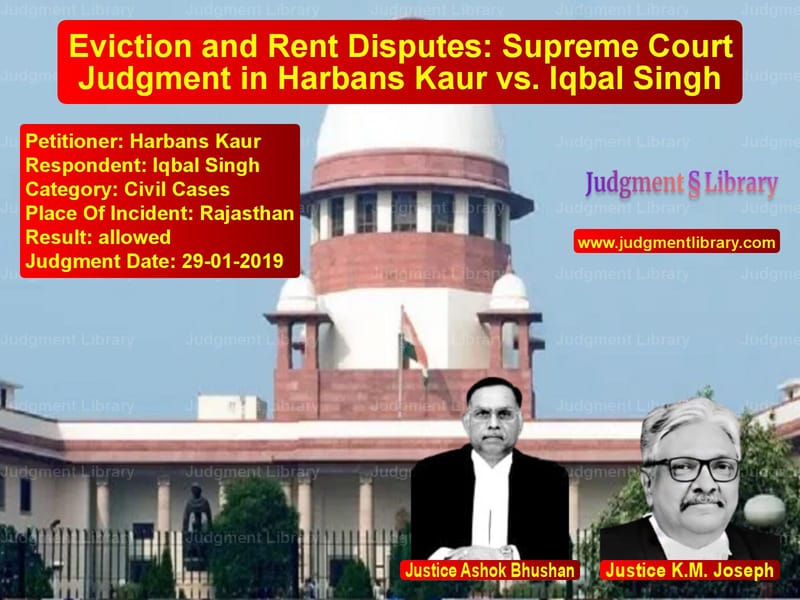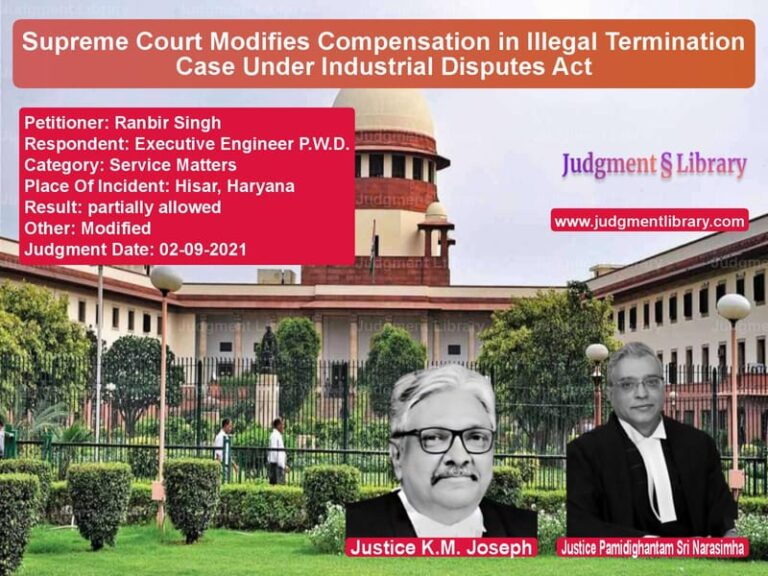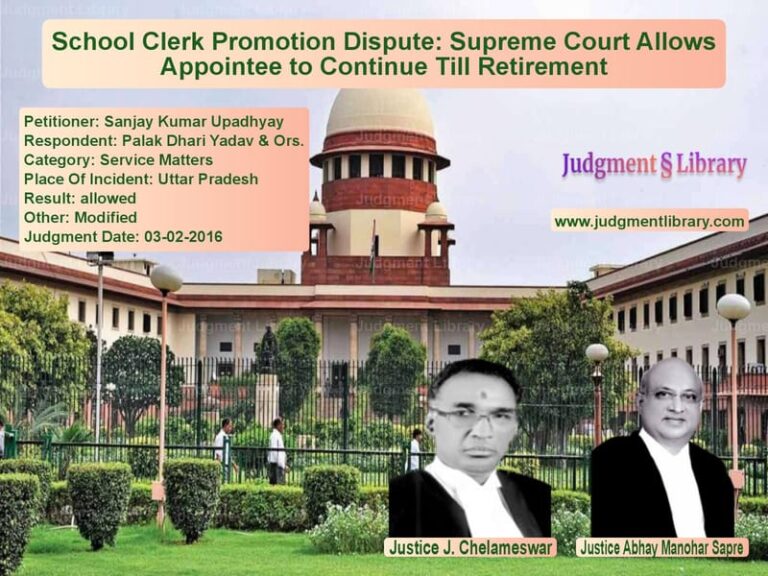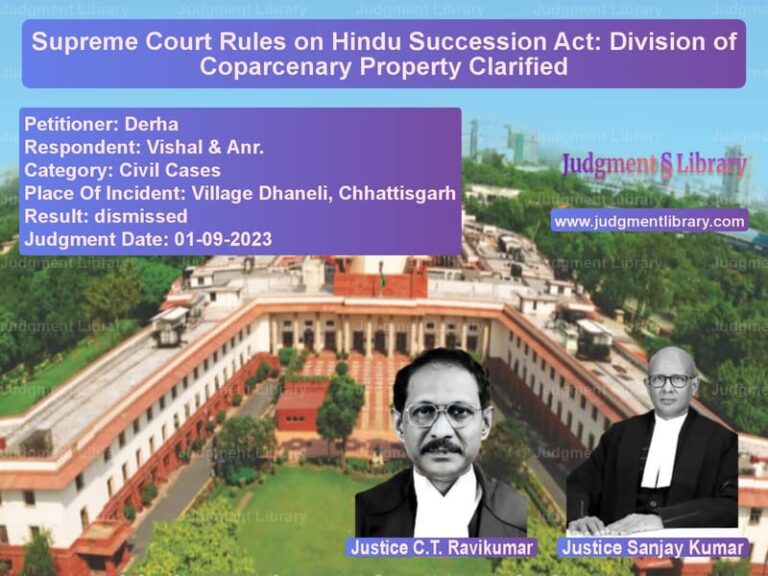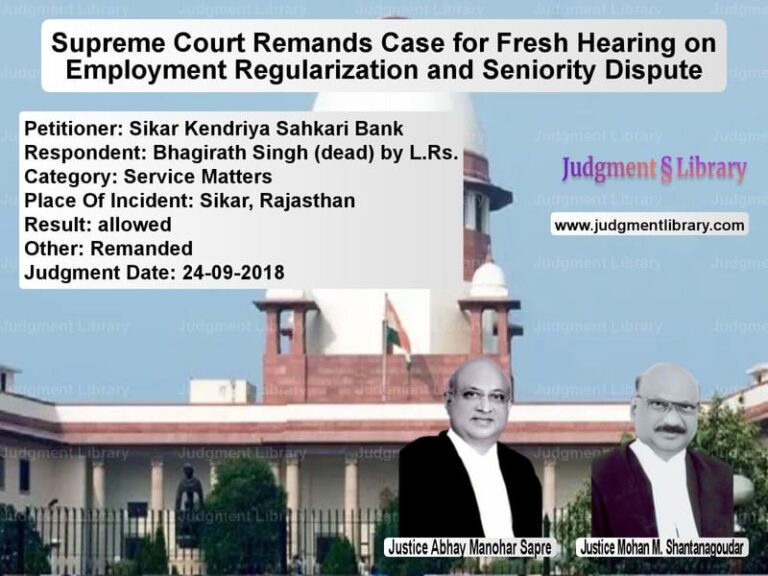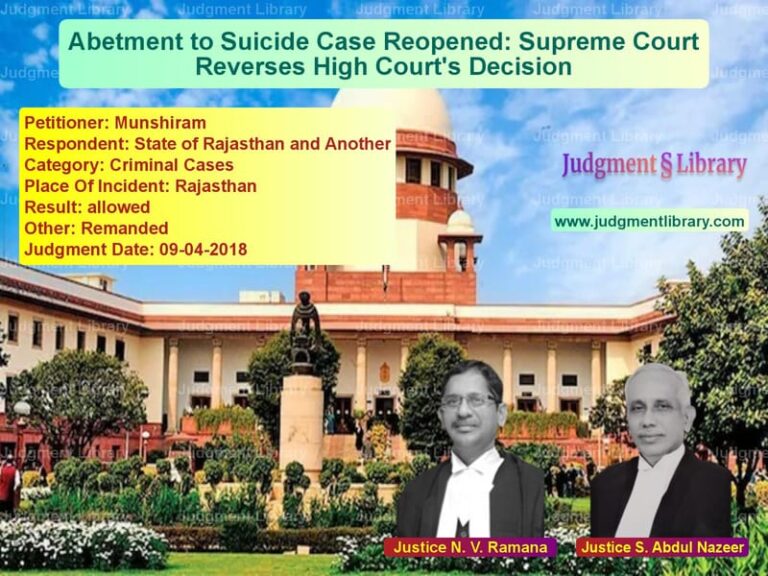Eviction and Rent Disputes: Supreme Court Judgment in Harbans Kaur vs. Iqbal Singh
The case of Harbans Kaur vs. Iqbal Singh & Anr. revolves around a dispute between a landlord and tenant regarding eviction and the payment of rent under the Rajasthan Rent Control Act, 2001. The appellant, Harbans Kaur, sought eviction of the respondent, Iqbal Singh, for non-payment of rent and arrears. The case examines the legal complexities of rent payment, eviction grounds, and the statutory protections afforded to tenants under the rent control laws. The judgment focuses on the interpretation of Sections 4, 6, 7, and 9 of the Act, with significant emphasis on the issue of rent revision and tenant default.
The dispute centers on whether the tenant, Iqbal Singh, was in default of rent payments and whether the landlord, Harbans Kaur, was entitled to evict him. Iqbal Singh had been paying rent at a rate of Rs.16,564 per month, which was later revised under the Rent Control Act. The tenant argued that the rent should be revised as per the new Act and that the arrears claimed by the landlord were excessive. The matter was contested at multiple levels, including the Rent Tribunal and the Rajasthan High Court, before reaching the Supreme Court.
Background of the Case
The appellant, Harbans Kaur, leased out Shops No. 3 and 4 in Plot No. 362 to Iqbal Singh in August 1995 at a rent of Rs.8,500 per month, with a provision for annual rent increases of 10%. Over time, the rent increased to Rs.16,564 per month by 2003. However, by 2004, Iqbal Singh stopped paying the rent for several months, and an arrear of Rs.1,15,945 accumulated. Harbans Kaur sent a notice demanding the arrears and threatening eviction. The tenant deposited a sum of Rs.95,200 but did not pay the full arrears. Subsequently, Harbans Kaur filed an eviction application before the Rent Tribunal, which was initially ruled in her favor.
However, Iqbal Singh contested the eviction order, arguing that the revised rent under the Act should have been Rs.13,600 per month, not Rs.16,564, as the rent was to be recalculated as per the new provisions of the Rajasthan Rent Control Act, 2001. The Rent Tribunal upheld the eviction, but Iqbal Singh appealed the decision to the Rajasthan High Court, which ruled in his favor, holding that the tenant was not in default and the eviction was unjustified. Harbans Kaur then appealed to the Supreme Court, which examined the legal issues surrounding the revision of rent, tenant default, and eviction grounds under the Act.
Arguments by the Appellant (Harbans Kaur)
The appellant argued that:
- The tenant had been paying rent at the rate of Rs.16,564 per month, which had been the agreed rent under the lease agreement since 1995.
- The tenant had defaulted in paying rent for several months and was liable for eviction under Section 9 of the Rajasthan Rent Control Act, 2001.
- The amount of Rs.95,200 deposited by the tenant was insufficient to cover the arrears of rent, which amounted to Rs.1,15,945.
- The Rent Tribunal’s order of eviction was correct, and the tenant’s claim to reduce the rent was baseless.
Arguments by the Respondent (Iqbal Singh)
The respondent countered with the following arguments:
- Under the Rajasthan Rent Control Act, 2001, the rent payable for the premises was to be revised and could not exceed a 5% annual increase, whereas the landlord had increased the rent by 10% annually.
- The tenant was not in default, as he had deposited Rs.95,200, which covered the rent up to December 2003 and part of January 2004.
- The tenant argued that the revised rent should have been Rs.13,600 per month, as per the provisions of Section 6 of the Act, and not Rs.16,564.
- The tenant had made a good faith attempt to pay the arrears, and therefore, eviction was not justified.
Supreme Court’s Observations and Judgment
The Supreme Court examined the Rent Control Act, 2001, and the legal provisions under which the tenant’s obligations to pay rent and the landlord’s right to evict could be evaluated. The Court reviewed the legislative framework concerning the revision of rent and the tenant’s liability for arrears of rent.
The Court noted:
“Under the provisions of the Rajasthan Rent Control Act, the landlord is entitled to seek revision of rent in accordance with the statutory provisions. However, the revision of rent cannot exceed the limits prescribed by the Act, which caps the increase at 5% per annum.”
The Court also clarified:
“The tenant’s obligation to pay rent is not absolved by his unilateral determination of the rent amount. The rent due from the tenant must be paid as per the agreed-upon terms or revised in accordance with the Rent Control Act.”
Final Judgment
The Supreme Court ruled in favor of the appellant, Harbans Kaur, and set aside the High Court’s judgment. The Court held:
“The tenant’s argument that the rent should have been reduced based on the provisions of the Rent Control Act is incorrect. The rent payable under the lease agreement is binding, and any revision of rent must be done in accordance with the provisions of the Act. The tenant’s failure to pay the full arrears constitutes default, and eviction is justified.”
The Court also observed that the tenant’s deposit of Rs.95,200 was insufficient to cover the arrears, and therefore, eviction proceedings would proceed. The Court directed that the tenant must clear the outstanding arrears before the eviction process could be halted.
Conclusion
This ruling clarifies the application of the Rajasthan Rent Control Act, 2001, in cases of rent disputes and tenant defaults. The Court emphasized that the tenant’s unilateral revision of the rent was not permissible, and arrears must be paid as per the agreed terms or as revised under the statutory scheme. The judgment highlights the importance of adhering to the statutory limits on rent revision and the grounds for eviction based on rent defaults.
Petitioner Name: Harbans Kaur.Respondent Name: Iqbal Singh.Judgment By: Justice Ashok Bhushan, Justice K.M. Joseph.Place Of Incident: Rajasthan.Judgment Date: 29-01-2019.
Don’t miss out on the full details! Download the complete judgment in PDF format below and gain valuable insights instantly!
Download Judgment: Harbans Kaur vs Iqbal Singh Supreme Court of India Judgment Dated 29-01-2019.pdf
Direct Downlaod Judgment: Direct downlaod this Judgment
See all petitions in Contract Disputes
See all petitions in Property Disputes
See all petitions in Landlord-Tenant Disputes
See all petitions in Judgment by Ashok Bhushan
See all petitions in Judgment by K.M. Joseph
See all petitions in allowed
See all petitions in supreme court of India judgments January 2019
See all petitions in 2019 judgments
See all posts in Civil Cases Category
See all allowed petitions in Civil Cases Category
See all Dismissed petitions in Civil Cases Category
See all partially allowed petitions in Civil Cases Category

